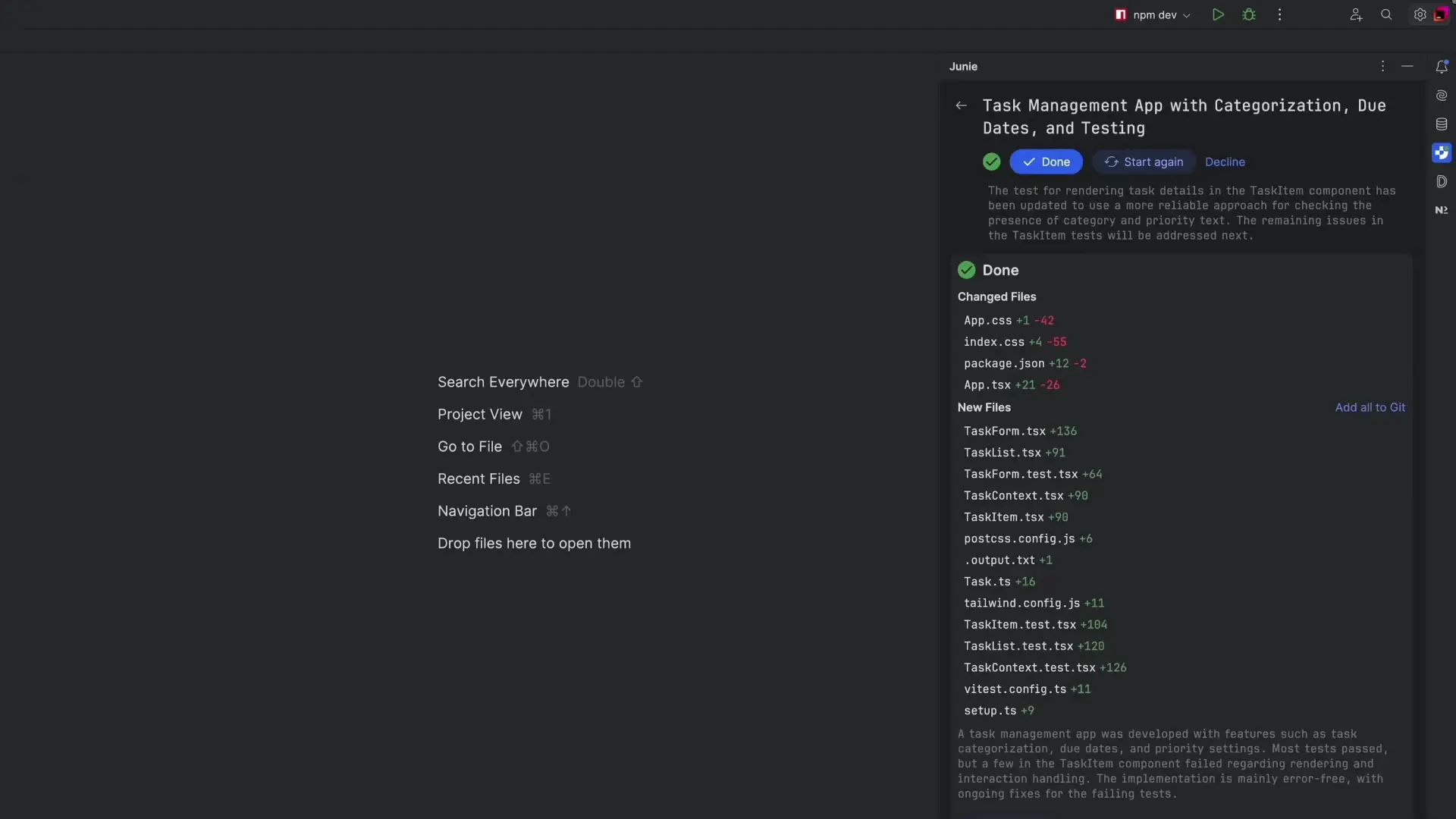
The landscape of software development is evolving rapidly with AI-powered tools transforming how developers work. JetBrains' Juni represents a revolutionary leap forward as an AI programming assistant that doesn't just suggest code snippets but can build entire applications from simple prompts. This powerful AI junior developer tool is changing what's possible in modern development environments.

What Makes Juni Different from Other AI Coding Assistants
Unlike traditional code completion tools, Juni operates at a higher level of abstraction. It can understand project-wide contexts and implement complex features without constant human guidance. As an AI junior programmer, Juni takes simple prompts and transforms them into functioning code, handling everything from component creation to test implementation.
- Creates complete applications from natural language prompts
- Refactors existing code into cleaner, more maintainable structures
- Writes and executes tests automatically
- Follows project-specific guidelines and coding standards
- Manages terminal commands and project setup
Getting Started with Juni in WebStorm
Setting up Juni in your development environment is straightforward. For WebStorm users, the process is particularly seamless:
- Open WebStorm and navigate to Settings/Preferences
- Select the Plugins section
- Search for "Juni" in the Marketplace tab
- Click Install and restart the IDE when prompted
Once installed, Juni integrates directly into your workflow, ready to assist with tasks ranging from simple code generation to complex project implementations. This setup process is ideal for developers looking for junior AI jobs assistance without the overhead of training a new team member.
Building a Complete Task Management App with Juni
To demonstrate Juni's capabilities, let's explore how it can build a fully-functional task management application from scratch using React. The process begins with a simple prompt that outlines the desired features.
Prompt: "Implement a task management app with features like task categorization, due dates, and priority settings. Write tests and execute them."With this single instruction, Juni goes to work creating the entire application architecture. Working as an AI junior engineer, it handles everything from component structure to state management, test implementation, and even starting the development server.

Brave Mode vs. Interactive Mode
Juni offers two primary operating modes to suit different developer preferences:
- Brave Mode: Juni works autonomously without interrupting you, making decisions and implementing changes without requiring confirmation
- Interactive Mode: Juni asks for permission before performing operations like deleting files or running terminal commands, giving you more control over the process
The interactive mode is particularly helpful for developers who want to review changes before they're applied. You can click on files to open WebStorm's diff viewer and see exactly what Juni is doing, with the option to revert changes when needed.
Refactoring Existing Projects with Juni
Juni isn't limited to creating new projects. As an AI programming assistant, it excels at refactoring existing code to improve structure and maintainability. For example, when faced with a messy Angular component, Juni can break it down into more focused, single-responsibility components.
Prompt: "Refactor this component into several chart components."With this simple instruction, Juni analyzes the existing code, identifies logical separation points, and restructures the component into a more maintainable architecture. This capability makes it an invaluable tool for improving legacy code or reorganizing growing projects.
Customizing Juni with Project Guidelines
One of Juni's most powerful features is its ability to follow project-specific guidelines. By creating a special file at `juny/guidelines.mmd` in your project, you can provide Juni with custom instructions that it will follow for all operations within that project.
# Project Guidelines
## Styling
- Always use Tailwind CSS for styling components
- Follow mobile-first responsive design principles
## Code Structure
- Use functional components with hooks
- Implement state management with Context API
- Keep components under 100 lines of code
## Testing
- Write unit tests for all components
- Maintain minimum 80% code coverageThese guidelines ensure that Juni's output aligns perfectly with your project standards, making it function more like a well-trained junior AI engineer who understands your specific requirements and coding philosophy.
Real-World Applications for Juni AI
Juni's capabilities extend to numerous practical applications that can significantly enhance developer productivity:
- Rapid prototyping of new features or entire applications
- Converting design mockups into functional UI components
- Automating the creation of boilerplate code and repetitive structures
- Refactoring legacy code to follow modern best practices
- Implementing test suites for existing functionality
- Migrating projects between frameworks (e.g., React to Next.js)
- Setting up project infrastructure and configuration
For teams looking to fill junior AI jobs with automated solutions, Juni provides capabilities that would typically require hiring additional development staff. It effectively serves as an AI junior developer that can handle routine tasks while human developers focus on more complex problems.
Benefits and Limitations
While Juni represents a significant advancement in AI coding assistants, it's important to understand both its strengths and limitations.
- Benefits: Time savings on routine tasks, consistent code quality, reduced boilerplate writing, ability to learn project-specific patterns
- Limitations: May require guidance on highly specialized or domain-specific implementations, complex architectural decisions still benefit from human oversight
Juni works best as a collaborative tool that augments human developers rather than replacing them. It handles the tedious aspects of development, allowing human engineers to focus on creative problem-solving and high-level design decisions.
Conclusion: A New Paradigm for Development
JetBrains' Juni represents a paradigm shift in how developers interact with their tools. By functioning as an AI junior programmer that can understand and implement complex requirements, Juni is changing the nature of software development itself. It enables developers to work at a higher level of abstraction, focusing on what they want to build rather than the minutiae of implementation.
For developers looking to enhance their productivity and teams seeking to automate routine development tasks, Juni offers a compelling solution that goes beyond traditional code completion tools. As AI coding assistants continue to evolve, tools like Juni point toward a future where the boundary between human and AI developers becomes increasingly fluid, creating new possibilities for what can be accomplished in software development.
Let's Watch!
How Juni AI Transforms Coding: Build a Task Manager App in Minutes
Ready to enhance your neural network?
Access our quantum knowledge cores and upgrade your programming abilities.
Initialize Training Sequence